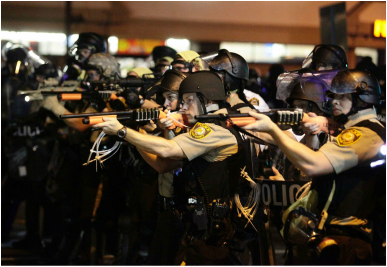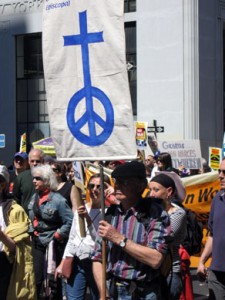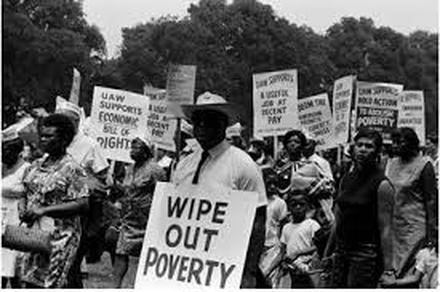|
4/29/2015 Comments Standing Amidst the Wrath of GodBy: Nichola Torbett  The wrath of God has been kindled and is pouring out of Baltimore in images of police cars on fire and CVS windows broken. It pours out of Baltimore as it poured out of Ferguson last summer. In the faces of chanting protestors there, I see the power of the life force refusing to be repressed any longer. The life of God is rising up and destroying the instruments of oppression like so many drowned Egyptian chariots. Praise God. Praise God, but I think if we’re honest, it makes a lot of us American Christians, and especially white American Christians like me, uncomfortable. And if ever we needed to be honest, it is now. In predominantly white progressive Christian circles, we are squeamish about this concept: the wrath of God. For instance, I have always wanted to celebrate the escape of the Hebrew slaves from Egypt while glossing over the drowning of the Egyptian soldiers in the Red Sea. After all, the Egyptian soldiers were people, too. Didn’t God care about them?
Comments
Note: This article was originally posted on Women in Theology and is the second in a three part series. “The credit economy is a network of contracted servitude. … Whenever one spends money, one spends a portion of the substance, wealth and life of those who have undertaken loans. Yet the value of money is also backed by profitability, including the drudge of labour in sweatshops and factories, the exclusion from the formal economy of those who are not employed profitably, the consumption of natural resources and the erosion of ecosystems and societies. The value of money is still paid for in flesh and blood.” (Philip Goodchild, Theology of Money, 239) Note: This article was originally published on Women in Theology and is the first of what will be a three part series.
How could anyone expect to profit from unpayable loans without debtors who were already marked by their racial/cultural difference ensuring that at least some among them would not be able to pay? This is precisely what makes 'high-risk' securities profitable. The Black and Latino/a holders of subprime loans, like Dana, owe incomprehensible and unpayable monetary debts precisely because they are not constructed as referents of either the relationship between persons presumed in commerce (which Graeber states precedes all other economic circumstances) or the capacity that according to Karl Marx ultimately determines their value of exchange (the productivity which John Locke, David Ricardo, and Marx agreed elevated the human thing). (Denise Ferreira Da Silva and Paula Chakravartty, Accumulation, Dispossession, and Debt, 367) Money promises value, as Philip Goodchild announces in the quote above. The promise of value is also the production of more money. Because money promises value, for more value to be created, more money must be created. In Goodchild's elaboration, this creation of money to satiate the value it promises is the creation of debt. That is, the promise of value requires the creation of debt in order to produce value.
If money, according to Goodchild, is the promise of value ”a promise which creates debt” blackness, following Ferraira da Silva and Chakravartty's analysis, is the invention of an indelible indebtedness, the promise of a permanent inability to pay the debt that money creates. Blackness' indebtedness is a demarcation of the threat that is named poverty. The threat of poverty in the US is figured as black as the threat of global poverty is figured as Africa. The threat of poverty that blackness represents is the threat that secures the promise of money's value. In other words, money is valuable and desirable because its accumulation is how one proves they are not-black. Goodchild understands the threat to value as exclusion from participation in social life and the loss of freedom: 1/9/2015 Comments On Ferguson and PropertyBy: Amaryah Armstrong Note: post originally appeared on the Women In Theology blog.  I’m tired of people sharing pictures of folks in Ferguson who are stopping looting. While I understand the impulse, attempting to show that there are a multiplicity of responses to the verdict and that not everyone feels the same about property destruction, it also seems to repeat the criminalizing of folks who do loot and suggest a certain respectable propriety as what the “good” protestors are doing. This continues a similar delegitimizing of property destruction and looting that the mainstream media panders in. But property destruction and looting are not senseless. They’re not dumb. They’re a response. An uncomfortable response for a society who thinks private property is an extension of our bodies. But given that those who are descendents of people who were property, those dispossessed who through policing are made out to be property for the state, it would seem in the looting and property destruction is a critique of private property as the invention that produces public property, which is black flesh. And this production of public property as blackness is the production of its profitability as its expendability. Darren Wilson received 500k in support of his defense of this division of property, paid leave, a marriage celebration, and a public interview to top it off.  Editor’s Note: Make sure to read parts one, two, and three before this last part in Dan Oudhorn’s series challenging the somewhat flimsy ways we’ve tried to embrace the way of Jesus even as we accommodate the “death-dealing powers of our day.” Be forewarned–this is the most provocative part of the series. All too often, those involved in Christian communities are so solely focused upon enacting a creative, life-giving alternative that they end up neglecting the concomitant work of resistance to the death-dealing powers of our day. This is a point I have inherited from cultural theorists and philosophers like Jean-Paul Sartre, Michel Foucault, and Jacques Derrida. If, in the context of death, we wish to participate in something that is new and life-giving, then we must simultaneously, if not first of all, engage in the destruction of that which is death-dealing. So, for example, taking feminism seriously requires us to not only ensure that women and men are accorded the same status and judged by the same standards; it also requires us to abolish previous structures, attitudes, and discourses that were patriarchal and androcentric. Or, to take a second example, we can see how the worship of YHWH necessarily requires the Israelites to destroy their idols in the Old Testament, and necessarily requires Jesus to overturn the tables of the moneychangers in the New Testament. Therefore, if we are hoping to be involved in communities of new creation, committed to life, love, solidarity, and justice; then we must also be committed to resisting and destroying that which is given over to death, hatred, alienation and injustice. It is not enough for us to simply focus upon being a creative alternative to the status quo. We must also attack the status quo. Doing so does not mean that we have given in to a “false soteriology”. I once thought this, given the way I have been influenced by the Duke School and scholars like Stanley Hauerwas and William Cavanaugh. Both Hauerwas and Cavanaugh have made convincing arguments that liberal democracies operate with a false soteriology and look to the State for salvation… when in actuality salvation is found in Christ and in the Spirit-empowered community of those who follow him.  Editor’s Note: In parts one and two of this series, Dan Oudshoorn explored the challenges (and hypocrisies) of living in solidarity with folks in the “margins.” Now his attention begins to shift towards the necessity of resistance if we are to participate in liberated communities. In this article, he explores the way in which private property under-girds injustice. If we are serious about our desire to share space, share life together, and participate in God’s new creation, then we must seriously reconsider our understanding of and relationship to private property. Indeed, the more I study the Bible and economics, the more I am convinced that private property is at the core of many of the problems we face and is, itself, a fundamentally anti-Christian belief and practice. There are three sources that have been particularly influential upon me in this regard. The first is the book Faith and Wealth by Justo Gonzalez. In this book, Gonzalez demonstrates the ways in which the Church Fathers consistently and strenuously attacked notions of private property and replaced those notions with a biblical theology that stresses that everything in creation and culture exists as a gift of God for the benefit of all. Furthermore, because the God of the Bible is defined by acts of benevolent and abundant giving, the same characteristic should define the people who follow this God. Therefore, if we wish to live in light of the biblical traditions, we would do well to draw our inspiration from the pre-monarchic economics of the Hebrews, from the correctives offered by the prophets, from the type of collectivity practiced by the early community of disciples gathered around Jesus, and from the economic mutuality that comes to the fore in the Collection that dominates the later years of Paul’s Aegean mission. Therefore, Gonzalez convincingly demonstrates that those who participate in the economy of the Christian God should reject any economics premised upon a right to private property. |
Disclaimer
The viewpoints expressed in each reader-submitted article are the authors own, and not an “official Jesus Radicals” position. For more on our editorial policies, visit our submissions page. If you want to contact an author or you have questions, suggestions, or concerns, please contact us. CategoriesAll Accountability Advent Anarchism Animal Liberation Anthropocentrism Appropriation Biblical Exegesis Book Reviews Bread Capitalism Catholic Worker Christmas Civilization Community Complicity Confessing Cultural Hegemony Decolonization Direct Action Easter Economics Feminism Heteropatriarchy Immigration Imperialism Intersectionality Jesus Justice Lent Liberation Theology Love Mutual Liberation Nation-state Nonviolence Occupy Othering Pacifisim Peace Pedagogies Of Liberation Police Privilege Property Queer Racism Resistance Resurrection Sexuality Solidarity Speciesism Spiritual Practices Technology Temptation Veganism Violence War What We're Reading On . . . White Supremacy Zionism ContributorsNekeisha Alayna Alexis
Amaryah Armstrong Autumn Brown HH Brownsmith Jarrod Cochran Chelsea Collonge Keith Hebden Ric Hudgens Liza Minno Bloom Jocelyn Perry Eda Ruhiye Uca Joanna Shenk Nichola Torbett Mark VanSteenwyk Gregory Williams Archives
October 2017
|
Search by typing & pressing enter



 RSS Feed
RSS Feed